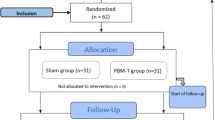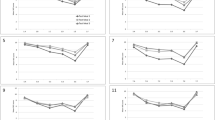Abstract
One of the major side effects of radical radiation therapy for head and neck malignancies is xerostomia, or dryness of the mouth. There is no clearly effective treatment for this condition, but we have observed that patients in our practice believe that their symptoms improve significantly when using two "over-the-counter" oral comfort products – Biotene (toothpaste, mouthwash and chewing gum) and Oralbalance gel. We decided to study these agents in a formal phase II study to evaluate their usefulness in patients with postirradiation xerostomia. Twenty-eight patients with post-irradiation xerostomia were entered on the study. All had biopsy-proven carcinoma of the nasopharynx, oropharynx, oral cavity, hypopharynx or larynx, and had received primary radiotherapy with curative intent (≥50 Gy in 20 fractions) more than 4 months before study entry. More than 75% of both parotid glands were included in the primary radiation field. There was no clinical evidence of recurrent disease. Patients were provided with a 2-month supply of Biotene mouthwash, toothpaste, chewing gum and Oralbalance gel. Response was evaluated 1 and 2 months after study entry using a patient-completed visual analogue scale to assess the severity of xerostomia and its effects on quality of life. For analysis, the scored baseline was subtracted from the later scores to assess change. Patients with an increase of 10 mm from their baseline score on the visual analogue scale were classified as having responded to the treatment intervention, and those with an increase of ≥25 mm from their baseline score were classified as having experienced a major improvement in their symptoms. After 2 months of treatment, 15 patients (54%) reported an improvement in intraoral dryness and 10 of these patients (36%) reported a major improvement. Similar proportions of patients (46% some improvement, 25% major improvement) reported an improvement in their ability to eat normally. Seventeen patients (61%) reported an improvement in oral discomfort, and 12 of these (43%) had a major improvement in their symptoms. The results of this study suggest that the use of Biotene (mouthwash, toothpaste and chewing gum) and Oralbalance gel can improve many of the symptoms of radiation-induced xerostomia. A placebo effect could account for many of the observed improvements in symptoms, and in order to assess the role of these agents in the management of patients with postirradiation xerostomia a randomised phase III study is needed.
Similar content being viewed by others
Author information
Authors and Affiliations
Additional information
Published online: 10 March 2000
Rights and permissions
About this article
Cite this article
Warde, P., Kroll, B., O'Sullivan, B. et al. A phase II study of Biotene in the treatment of postradiation xerostomia in patients with head and neck cancer. Support Care Cancer 8, 203–208 (2000). https://doi.org/10.1007/s005200050286
Issue Date:
DOI: https://doi.org/10.1007/s005200050286




